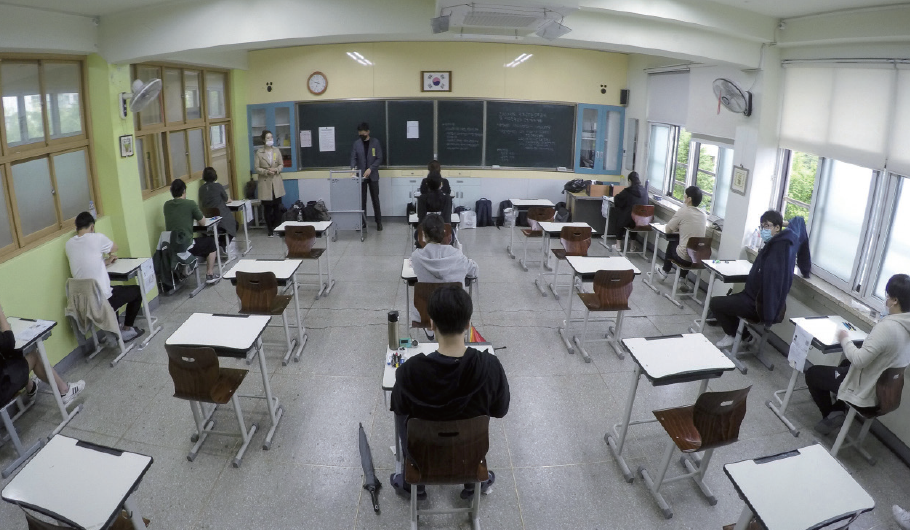This year, the competition rate for the Grade-9 civil service examinations dropped significantly. Also, the competition rate for the Grade-7 exam was recorded as the lowest ever. It seems that the “Public Official Fever” has become an outdated word. Also, with private companies enhancing their internal welfare services for employees in their 20s and 30s, it is now time for the public sector to change. Based on this trend, the Sungkyun Times (SKT) will introduce why the young generation has been avoiding the public sector and possible suggestions for the future public official system.
Public Official Avoiding Phenomenon
Original Recognition of Public Officials
Contrary to current perception, only a few years ago, the public sector was called the “heavenly workplace” for those in their 20s and 30s (the 2030 generation). According to a survey conducted by job search service websites Incruit and Albacall in 2020, 32% of the 2030 generation workers in other sectors responded that they would choose to work as public officials if they had a chance to choose their first workplace again. The main reason for this high preference was a guarantee of the retirement age, as well as, a regular pension payment that ensures life after retirement. Furthermore, after the coronavirus disease 2019 (COVID-19), the high unemployment rate increased demand for the public sector due to its stable and well-established welfare system. More and more people started to prioritize job security. However, public officials are no longer a job sought after among the 2030 generation.
Changing Demands and Job Market

Compared to previous survey results, the popularity of public officials has recently decreased sharply among the 2030 generation. Except for a few spots in the Grade-5 positions, the number of people who take the civil service examinations is decreasing. According to the Ministry of Personnel Management (MPM), the competition rate for the Grade-7 civil service exam was 76.7:1 in 2016 but fell to 42.7:1 in 2022, the lowest in 43 years. In addition, according to The Chosun Ilbo, the proportion of public officials who resigned from their jobs in less than five years doubled in 2021 compared to four years ago. Moreover, the Yoon Sukyeol administration, which claims to stand for a “small government,” has suggested the possibility of a wage freeze and reduction of the number of public officials by 1% yearly. The Korean Government Employees’ Union demanded a 7.4% wage increase to this decision, reflecting the inflation rate in June. Unfortunately, according to the Minister of Economy and Finance (MOEF), a wage freeze seems inevitable since wage increases will exacerbate high inflation. As a result, many in the 2030 generation have turned to start-ups or organizations with a freer atmosphere.
Reasons for Avoiding Civil Service
Hierarchical and Conservative Organization Environment
The phenomenon of retiring public officials is intensifying as the liberal-minded 2030 generation is reluctant to become a part of the rigid and conservative culture of the public sector. For example, proficient and skillful public officials are often assigned to more challenging and burdensome work rather than receiving a reward for their performances. Despite the unfair workload, public officials are forced to follow the work guidelines due to the hierarchical evaluation system. There is also a bizarre culture in which a superior’s words are considered law since their evaluation has massive power in the sector’s one-dimensional evaluation system. Even if the supervisor’s instructions are unreasonable, the evaluation system prevents them from disobeying. Moreover, according to the Joongang Ilbo, many public officials have claimed that they are tired of dealing with malicious petitioners. Even though the number of malevolent clients that use verbal abuse is increasing, the public sector has no power to deal with this issue since they can be disadvantaged by the complaints. Such cases show the shackles of working as a public official. Lee Ha-young, a Grade-9 public official, commented, “Even if my tasks are burdening, I am not in a position to make suggestions about this issue.” Thus, the 2030 generation is turning away from the public sector due to malicious civilian complaints and an irrational organizational culture.

Unworthy Treatment
The low balance between work and leisure is also another reason why the 2030 generation is turning away from the public sector. For the 2030 generation, balancing work and life is essential in choosing a job. However, problems in personal welfare get worse as public officials move positions on a national scale. All public officials rotate workplaces regularly. In the case of federal public officials, the rotation range is nationwide. In other words, as officials rotate the whole country, they face problems including unstable housing, additional moving expenses, and transportation charges. Lee Jeong-hoo, a Grade-9 local official, said in an interview with the Joongang Ilbo that he earns ₩1.8 million after-tax, which is only slightly above the minimum wage. National officials suffer from much more severe welfare conditions than local positions. They receive fewer welfare fees, and even if the state provides an official residence, it is usually far from their workplaces. There is also an issue with the public officials’ pensions: the amount of monthly payments has increased, but the refund after retirement Young Generation Considers Quitting has decreased. Unlike the general pension, those in the civil service must sign up for the public official pension scheme. They pay 18% of their monthly income to the Pension Service and receive it after retirement. However, as the payout ratio is lower than the National Pension Service, they cannot actually recover the full payment.

Ways to Improve
Preferred Organizational Culture for the 2030 Generation
The loopholes of the ineffective system should be solved to protect officials and the problem of handing over tasks. First and foremost, existing manuals and basic guidelines for civil complaints must be revised. It is necessary to take preventive measures to deal with malicious complaints rather than hold the officials responsible. Thus, all institutions should prepare basic countermeasures, such as installing closed-circuit television (CCTVs) in the civil service rooms or arranging “petition police.” Moreover, the legal system should be reformed to inform the public that verbal or physical violence against officials will lead to solid punishment. Regarding the outdated evaluation system, the “Public Sector Culture Innovation Roadmap,” a multi-dimensional evaluating system where officials get evaluated by peers, will be introduced in August. It is a way to compensate for the limitations of the constricted structure of hierarchical bureaucracy. Furthermore, public institutions have low autonomy in work due to the vertical decision-making systems; thus, the 2030 generation has less opportunity to have initiative. If the 2030 generation feels a sense of belonging and satisfaction, they will be able to find meaning in work. To this matter, Lee, the Grade-9 public official also said, “A horizontal communication system should be established,” and that “officials should be given a chance to speak out about problems.”
Gurantee Worthy Treatment for Public Officials
Public officials must be compensated with enough payment to prevent the early resignation of the 2030 generation. Recently, The Korea Institute of Public Administration (KIPA) has suggested reorganizing the remuneration system from a rank-based wage system to a productivitybased one. According to the new “Public Sector Culture Innovation Roadmap,” the indicators measuring the status and level of the officials’ workloads will increase. Also, the MPM announced that it would implement an “Active Administration Mileage System” in June to provide frequent rewards according to the officials’ efforts. Each department’s superiors will provide a mileage that can be exchanged for gift cards, duty exemption rights, reward leave, and book tickets for public officials lower than Grade-4 or 5. However, these rewards are still impractical for the 2030 generation and cannot be the driving force to solve stress from the authoritarian organizational culture: a fundamental solution is needed. In the case of Singapore, a unique public official remuneration system was implemented thirty years ago by selecting the eight highest earners in six professional services. Then, two-thirds of their median income was used as the base salary for senior public officials – this improved work efficiency and treatment by forming a culture in which young officials become more responsible. Future development is expected to strengthen the motivation of new public officials with low wages and raise awareness of fair compensation.

There is a reason why the past “heaven workplace” has become a commonly avoided workplace. As times have changed, the public sector must also undergo change to reduce the gap between older and younger generations. The SKT hopes this article will become a chance for Kingos to consider the current phenomenon.
